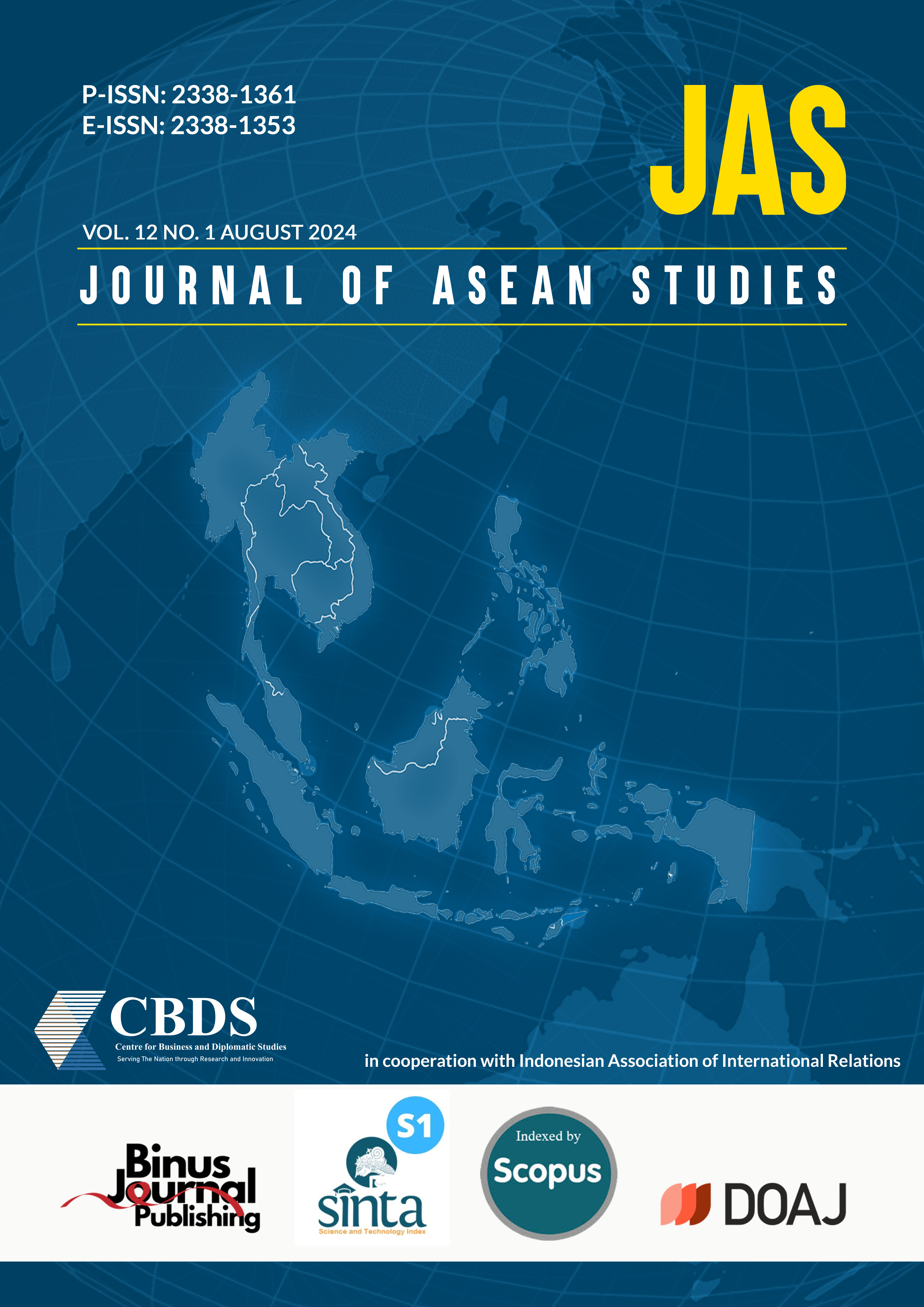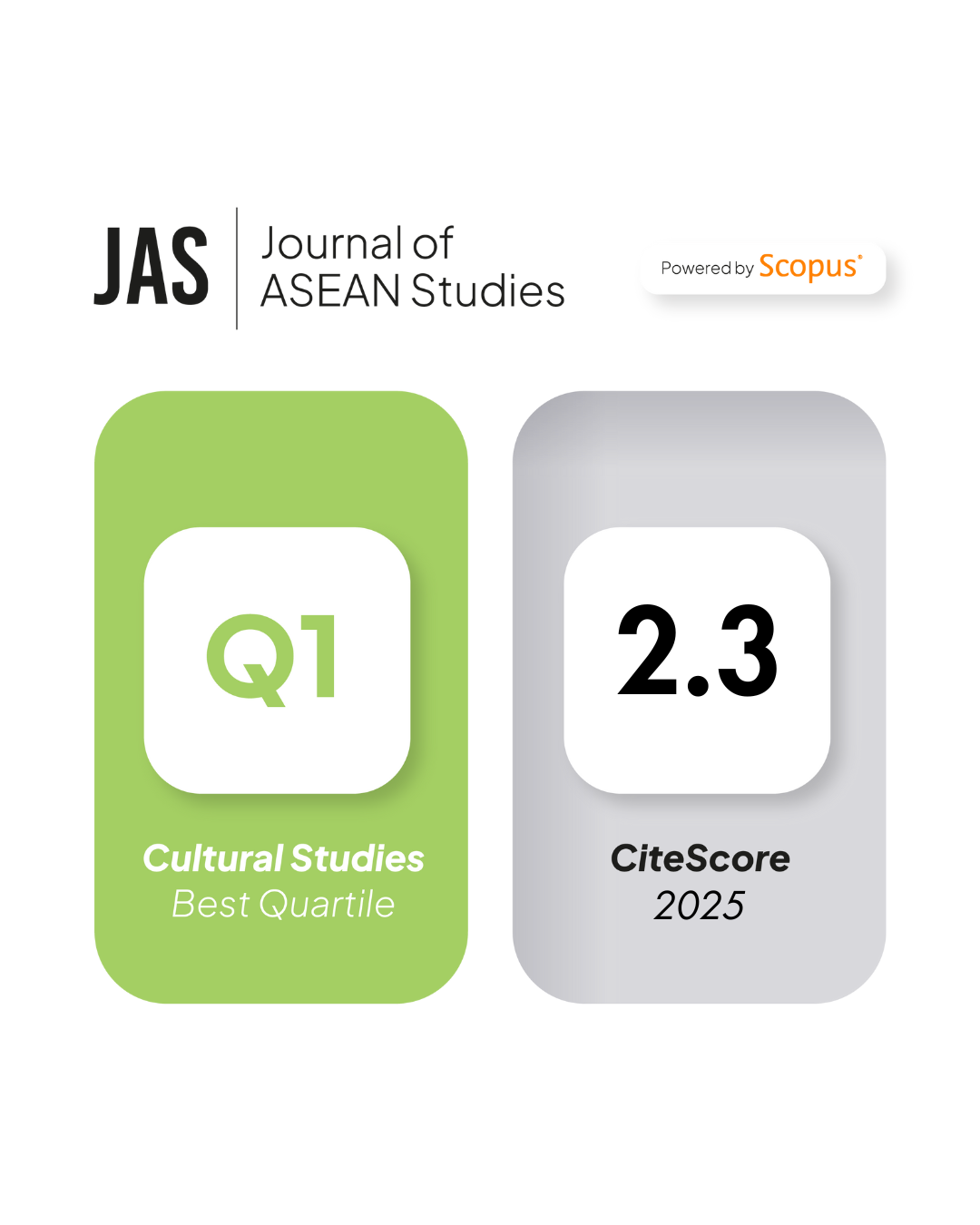Does Terrorism Still Spread Fear to ASEAN’s Financial Market?
DOI:
https://doi.org/10.21512/jas.v12i1.7389Keywords:
abnormal return, fear, stock exchange, terrorismAbstract
The research aimed to examine the financial markets’ responses to terrorist attacks in Southeast Asia. Market reactions were a reflection of public sentiment. The market reaction was calculated using the stock index indicator and the currency exchange rate of the country relative to the US Dollar. The research employed a paired test to compare the period prior to and following the terrorist attack. The research used Wilcoxon Test to examine 38 terrorist attacks across four Southeast Asian nations: Indonesia, Thailand, Philippines, and Malaysia. The research concludes that the stock index exhibits both normal and abnormal returns between pre-incident and post-incident periods. Post-incident returns are higher than pre-incident returns. Stockholders are not required to sell their existing holdings in response to a terrorist attack. Between pre-incident and post-incident investors who do not invest in the capital or money markets, the foreign exchange market does not exhibit significant changes. Investors can profit by purchasing stock or foreign currency on the day of the incident or one day afterwards and selling it three days later.
References
Ahmad, T., Hussain, S., Akbar, M., & Rehman, A. U. (2022). Impact of terrorism on stock market: Evidence from developed and developing markets. International Journal of Disaster Risk Reduction, 70. https://doi.org/10.1016/j.ijdrr.2022.102786
Anggraeni, A. P., Handini, P. D., & Wulandari, W. (2021). Conference on economic and business innovation. Socialvetenskaplig Tidskrift, 1–7. https://doi.org/10.3384/svt.2020.27.2.3523
Arif, I. (2017). Terrorism and stock market nexus: New evidence from wavelet analysis. South Asian Journal of Management Sciences, 11(02), 95–108. https://doi.org/10.21621/sajms.2017112.01
Astari, W., & Afrizal (2017). Kebijakan pemerintah Indonesia dalam mengantisipasi perkembangan gerakan terorisme di kawasan Asia Tenggara tahun 2010-2015. Jurnal Online Mahasiswa: Fakultas Ilmu Sosial dan Ilmu Politik, 4(2), 1–12.
Bangun, B. H. (2019). Pengaruh dari kedaulatan negara terhadap pelaksanaan mekanisme kerjasama ASEAN dalam pemberantasan terorisme. Pandecta: Research Law Journal, 14(1), 1–12. https://doi.org/10.15294/pandecta.v14i1.17777
Chong, H. H. (2020). What do foreign exchange markets say about election outcomes? A comparison between Malaysia, Singapore and Philippines. MPRA Munich Personal RePEC Archieve SSRN Electronic Journal. https://doi.org/10.2139/ssrn.3505123
Christopher, D., & Layyinaturrobaniyah. (2019). Indonesian capital market reactions for the election of Donald Trump as United States President (empirical study on multinational companies listed on the Indonesia Stock Exhange). Journal of Management and Business, 18(1), 32–41. https://doi.org/10.24123/jmb.v18i1.365
Cogan, M. S., & Mishra, V. (2021). Regionalism and bilateral counter-terrorism cooperation: The case of India and Thailand. Journal of Policing, Intelligence and Counter Terrorism, 1–22. https://doi.org/10.1080/18335330.2021.1906933
Darajati, R., & Syafei, M. (2019). Efektivitas ASEAN Convention on Counter Terrorism di dalam memberantas pembajakan di wilayah perairan Asia Tenggara. Jurnal Ilmu Hukum, 53(9), 1689–1699.
Fauziah, L., & Venusita, L. (2021). The reaction of Capital Markets in Indonesia, Singapore, Malaysia, and Thailand towards the announcement of lockdown policy during the beginning of the COVID-19. Journal of Accounting, Entrepreneurship, and Financial Technology, 2(2), 17–40.
Hadhek, Z., Halfaoui, S., & Lafi, M. (2019). Terrorism and stock market performance. International Research Journal of Finance and Economics, (171), 48–62.
Hamzani, A. I., Aryani, F. D., Khasanah, N., Aravik, H., & Yunus, N. R. (2020). The trend to counter terrorism in Asean. Journal of Advanced Research in Dynamical and Control Systems, 12(7), 105–113. https://doi.org/10.5373/JARDCS/V12I7/20201990
Hariyanto, I. T., & Murhadi, W. R. (2021). The phenomenon of dividend announcement on Stock Abnormal Return (Case in ASEAN Countries). Jurnal Manajemen Bisnis, 12(1), 1–18. https://doi.org/10.18196/mabis.v12i1.9001
Kusnandar, D. L., & Bintari, V. I. (2020). Perbandingan abnormal return saham sebelum dan sesudah perubahan waktu perdagangan selama pandemi COVID-19. Jurnal Pasar Modal dan Bisnis, 2(2), 195–202. https://doi.org/10.37194/jpmb.v2i2.49
Pangesti, A. P. K. (2019). Different test of Abnormal Return and TVA before and after stock split announcement. ACCRUALS (Accounting Research Journal of Sutaatmadja), 3(2), 205–211. https://doi.org/10.35310/accruals.v3i2.51
Saputra, G, E. F., Pulungan, N. A. F., & Subiyanto, B. (2021). The relationships between Abnormal Return, Trading Volume Activity and Trading Frequency Activity during the COVID-19 in Indonesia. Journal of Asian Finance, Economics and Business, 8(2), 737–745. https://doi.org/10.13106/jafeb.2021.vol8.no2.0737
Sevriana, L., & Febrian, E. (2021). How political situation affected Major Stock’s Abnormal Return in Indonesia. Jurnal Pasar Modal Dan Bisnis, 3(1), 145–158. https://doi.org/10.37194/jpmb.v3i1.74
Susianti, N., & Rahmawati, N. (2020). Abnormal Return saham JII Pra-Pasca PSBB COVID-19. Journal of Enterprise and Development, 2(2), 38–46.
Sudirman, A., & Sari, D. S. (2017). Building regional security in ASEAN in counter terrorism effort. Jurnal Wacana Politik, 2(1), 22–32.
Tavor, T., & Teitler-Regev, S. (2019). The impact of disasters and terrorism on the stock market. Jàmbá Journal of Disaster Risk Studies, 11(1), 1–8. https://doi.org/10.4102/jamba.v11i1.534
Utami, A. T. (2017). Analisis Trading Volume Activity dan Average Abnormal Return sebelum dan sesudah melakukan pemecahan saham (stock split) pada perusahaan yang terdaftar di Bursa Efek Indonesia. Jurnal Ekonomi dan Bisnis, 18(2), 164–173. https://doi.org/10.30659/ekobis.18.2.164-173
Wibisono, A. A. and Kusumasomantri, A. R. (2020). Assessing the expectations and limitations of ASEAN-EU counter-terrorism cooperation. Journal of ASEAN Studies, 8(1), 61-80, https://doi.org/10.21512/jas.v8i1.6171
Wicaksana, I. G. W. (2019). Militarizing counterterrorism in Southeast Asia. European Journal of East Asian Studies, 18, 205–235.
Winarto, P. O., & Sudirman, A. (2021). Penanggulangan terorisme di ASEAN melalui Our Eyes Initiatives: Studi mengenai cooperative security. Insignia Journal of International Relations, 8(1), 71–86.
Yahzunka, F., Siswoyo, M., & Ali, Y. (2018). Analysis of counter terrorism cooperation of Brunei Darussalam in the asean region. Jurnal Prodi Perang Asimetris, 4(1), 23–44.
Yonatan, C. B., Kasim, M. Y., & Bidin, C. R. K. (2017). Pengaruh pengumuman dividen terhadap harga saham dan Abnormal Return pada industri jasa di Bursa Efek Indonesia. Jurnal Ilmu Manajemen Universitas Tadulako, 3(1), 233–243.
Yuhendri, V. I., & Azizah, D. F. (2019). Analisis perbedaan Trading Volume Activity dan Abnormal Return sebelum dan sesudah stock split (studi pada perusahaan yang melakukan stock split yang terdaftar di Bursa Efek Indonesia periode 2016-2018 ). Jurnal Administrasi Bisnis (JAB)|, 73(1), 216–224.
Yulianti, E., & Siregar, I. W. (2011). Analisis Abnormal Return dan Abnormal Return Capitalization pada peristiwa Britain Exit (Brexit) 2016. Portofolio, 15(1), 27–44. https://doi.org/10.1007/springerreference_639
Zafar, S., Samy, M., Uddin, M., & Afridi, S. A. (2016). Impact of political instability on foreign and domestic firms listed in KSE. Abasyn Journal of Social Sciences, (Special Issue), 265–286.
Downloads
Published
How to Cite
Issue
Section
License
Copyright (c) 2024 Suwinto Johan

This work is licensed under a Creative Commons Attribution-NonCommercial 4.0 International License.


























